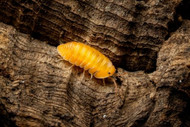Powder Orange Isopods
Posted by Noah White on Apr 5th 2024
Powder Orange Isopods
Introduction to Powder Orange Isopods
Are you curious about the fascinating world of isopods, especially the vibrant powder orange isopods? These tiny creatures are more than just insects; they are an important part of our ecosystem and can be a delightful addition to your terrarium or vivarium. In this article, we'll explore everything about powder orange isopods, from their unique characteristics to how to care for them.
What are Powder Orange Isopods?
Powder orange isopods, also known as orange powder isopods, are a type of terrestrial crustacean. Unlike their aquatic relatives, these isopods thrive on land. They are known for their striking orange color, which makes them a popular choice for terrarium enthusiasts and educators.
The Habitat of Powder Orange Isopods
In the wild, powder orange isopods are found in moist environments where they can access decaying plant matter, their primary food source. When keeping them in captivity, it's crucial to replicate their natural habitat. A mix of soil, coconut fiber, and decaying leaves or wood can create a suitable environment for these orange isopods.
Caring for Your Powder Orange Isopods
Caring for powder orange isopods isn't complicated, but it does require attention to detail. Here are some key points:
- Moisture: They need a moist environment, but not too wet. Overly damp conditions can lead to mold growth, which is harmful to isopods.
- Temperature: They prefer temperatures between 70-80°F (21-27°C). Avoid extreme temperatures.
- Food: Feed them decaying plant matter, vegetables, and fruits. Avoid citrus and spicy foods.
- Housing: A small container with ventilation holes is ideal. Include hiding places like bark or hollow logs.
The Lifecycle of Powder Orange Isopods
Understanding the lifecycle of these isopods is fascinating. They undergo simple metamorphosis, meaning they hatch from eggs and grow into adults without a pupal stage. It takes about two to three months for a powder orange isopod to reach maturity. Adults can live up to two years with proper care.
Benefits of Having Powder Orange Isopods
Here are a few reasons why you might want to consider adding these orange isopods to your ecosystem:
- Decomposers: They play a crucial role in breaking down decaying matter, making them beneficial for plant growth.
- Educational Value: They are great for teaching about ecosystems and the role of decomposers.
- Low Maintenance: Once their habitat is set up, they require minimal care.
Common Questions About Powder Orange Isopods
Q: Can powder orange isopods live with other animals?
A: Yes, they can coexist with non-aggressive species, especially in a vivarium setup.
Q: How often should I feed them?
A: A weekly feeding schedule is generally sufficient. Monitor their food intake and adjust as needed.
Q: Are they harmful to humans or pets?
A: No, powder orange isopods are harmless and non-toxic.
Conclusion
Powder orange isopods are not only a vibrant addition to your terrarium or vivarium but also play a significant role in our ecosystem. Their ease of care, coupled with their educational value, makes them a fascinating subject for hobbyists and educators alike. By understanding their needs and life cycle, you can successfully nurture these unique creatures.
Remember, the key to a healthy population of powder orange isopods is a balanced environment that mimics their natural habitat. With the right care, these orange isopods can thrive, offering a glimpse into the intricate world of small-scale ecosystems.
Embrace the opportunity to learn and care for these wonderful creatures, and enjoy the vibrant touch they bring to your environment! Whether you're a seasoned isopod enthusiast or a beginner, powder orange isopods offer a delightful and educational experience.
Fun Facts About Powder Orange Isopods
- Color Variations: While they are predominantly orange, some may have different shades or patterns.
- Social Creatures: They are known to live in groups, which helps them thrive.
- Sensitive to Chemicals: Be cautious with pesticides or chemicals in their environment, as they are highly sensitive.
Tips for Successful Isopod Keeping
- Regularly Check Moisture Levels: It's crucial to maintain the right balance of humidity.
- Avoid Overcrowding: Provide enough space for them to move and grow.
- Observation: Regularly observing your isopods can help you spot any issues early.
Incorporating Powder Orange Isopods into Ecosystems
These isopods can be a valuable addition to bioactive setups, where they aid in waste decomposition and soil aeration. They are especially popular in reptile and amphibian habitats, where they help maintain a clean and balanced environment.
Powder orange isopods are more than just a hobbyist's delight; they are a window into the complex world of ecosystems and the important role of decomposers. By providing the right care and environment, you can enjoy the beauty and benefits these creatures bring to your home or classroom. Dive into the world of powder orange isopods and discover the joy of nurturing these fascinating beings!

